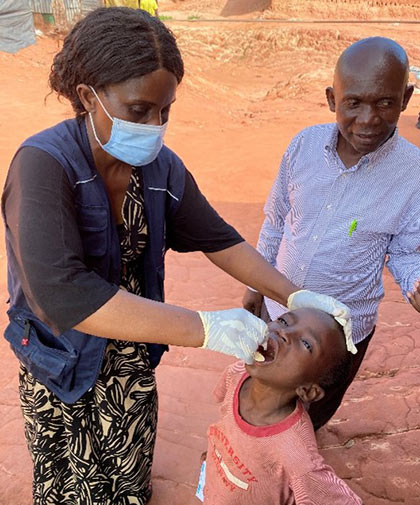About Global Cholera
Updated April 1, 2022
Cholera Can Cause Rapid Dehydration and Death if Left Untreated

A child receives an oral cholera vaccine in Democratic Republic of the Congo, 2021. Credit: WHO/Kabambi
Cholera is an acute diarrheal disease caused by toxin-producing strains of the bacterium Vibrio cholerae serogroup O1 or O139, which infects the small intestine. People can get sick when they swallow food or water contaminated with the cholera bacteria. Cholera infections are often mild, but about 1 in 10 people will develop life-threatening symptoms that can lead to shock, coma, and death within hours, if left untreated.
There Are Safe Vaccines That Can Help Prevent Cholera
There are several vaccines that can be used to help prevent cholera and improve health outcomes, in combination with standard cholera prevention measures like access to safe water and improved sanitation. The World Health Organization (WHO) recommendsexternal icon that cholera vaccines be used in areas where local transmission of cholera occurs, during humanitarian crises with a high risk of cholera, and during cholera outbreaks.
Many Low- and Middle-Income Countries Face the Threat of a Cholera Outbreak
While cholera has been eliminated in high-income countries, it continues to disproportionally affect communities in low- and middle-income countries. There are ongoing outbreaks in Africa, Eastern Mediterranean, South Asia, and Southeast Asia. Cholera vaccines are important tools for helping to prevent cholera and control cholera outbreaks.
CDC’s Division of Foodborne, Waterborne, and Environmental Diseases cholera website has additional information about other measures to prevent cholera including global water, sanitation, and hygiene (WASH) interventions.